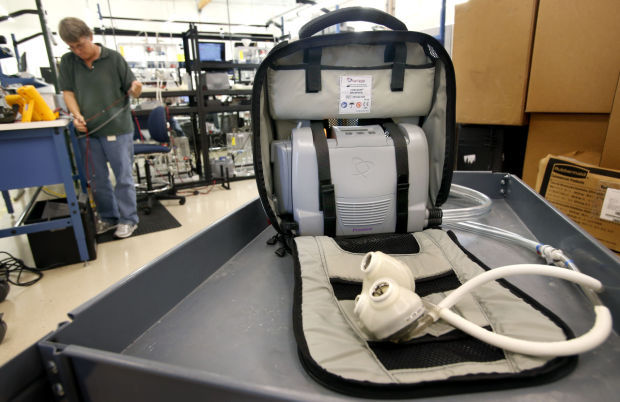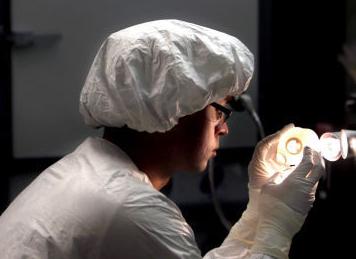After years of regulatory wrangling, Tucson-based SynCardia Systems Inc. has won crucial approval from the U.S. Food and Drug Administration for a small portable driver for its temporary artificial heart.
The FDA approval means the portable Freedom driver can be used with SynCardia’s temporary Total Artificial Heart as a bridge to transplants in patients who are clinically stable, SynCardia President and CEO Michael Garippa said.
Garippa said he expects FDA approval of the portable driver — previously approved for clinical use in Europe and Canada — to greatly expand the use of SynCardia’s artificial heart as an approved bridge to transplants.
It also allows the company to launch trials to seek FDA approval of the system as a so-called “destination therapy” for terminal heart patients who are not transplant candidates, as well as to help drive development of a smaller version of the Total Artificial Heart for small adults and children.
“This is an important approval in its own right, but it also will be a gateway to destination therapy and expanded use of the device,” Garippa said, adding that many hospitals are reluctant to adopt therapies in clinical trials because of their cost and complexity.
Dr. Jack Copeland, a former University of Arizona heart surgeon and SynCardia shareholder who helped pioneer the artificial heart, said the FDA approval is an important step to make the SynCardia artificial heart a standard of care.
“In today’s economy, people aren’t going to use a total artificial heart if it means the patient has to sit in the hospital until he gets a transplant — it’s just too expensive,” said Copeland, who left the UA in 2010 and recently retired as a professor of surgery at the University of California-San Diego.
Copeland said the heart driver has long been a stumbling block to wide adoption of SynCardia’s artificial heart, recalling how the limited supply of larger FDA-approved drivers had to be shipped around the world as needed.
“It’s not a generally accepted technology, and it just hasn’t been generally available for a lot of reasons, the driver being the main one,” he said. “To see it become available and get out there in the mainstream of end-state heart disease medicine and surgery is very satisfying for me. We’ve put a lot of work in it, believed in it, and it’s nice to see other people believe in it, too.”
The FDA had previously approved use of the Total Artificial Heart with the original, filing-cabinet-sized driver, known as “Big Blue,” and the smaller but still cumbersome Companion 2 driver.
The roughly toaster-sized Freedom portable driver — like its precursors essentially a precision pneumatic pump — has been approved for use in Europe since 2010 and in Canada since 2011. It has been available to some U.S. patients in clinical trials under an FDA investigational device exemption.
SynCardia's Total Artificial Heart was approved by the FDA in 2004. More than 1,300 of the devices have been implanted in patients, including a record 161 in 2013 alone.
A medical-device industry journalist said approval of the Freedom driver is important for patients as well as for SynCardia.
“The mobile driver unit is absolutely an important piece, because (otherwise) patients are tethered to this large machine,” said Dave Fornell, editor of the Chicago-area based magazine Diagnostic and Interventional Cardiology. “This untethers them from the hospital room.”
The effort to win FDA approval for the portable driver began more than four years ago, Garippa said.
The FDA’s premarket approval study of the Freedom driver involved 22 SynCardia-certified centers in the U.S. that provided the driver to 96 SynCardia Total Artificial Heart patients. Another 10 patients were given the Freedom under compassionate-use exemptions at nine other SynCardia centers.
Use of the SynCardia artificial heart with the Freedom driver allowed 75 of those patients to be discharged from the hospital, while 86 percent of the 106 patients either lived until they got heart transplants or were alive and supported by the system as of June 30.
All of the trial subjects — who were monitored at home for at least 90 days or until they received donor hearts — and their caregivers showed they could learn to use and manage the 13.5-pound, battery-operated driver, Garippa said.
With FDA approval of the small heart driver in hand, SynCardia plans to launch trials to win approval of the system as a destination therapy, as well as trials of the smaller artificial heart, in the fourth quarter of this year, Garippa said.
The University of Arizona Medical Center is expected to participate in both trials, he said.
While SynCardia’s artificial heart is costly — some $125,000 for the implant and driver use alone — the portable driver can save patients and insurers thousands of dollars a day in hospital costs, while freeing up beds for the hospitals.
“It’s got benefits from top to bottom,” Garippa said.
Though other companies make ventricular-assist devices to treat people who have lost function in one heart ventricle, SynCardia is the only company with an FDA-approved artificial heart for patients with biventricular heart failure.
Another U.S. company, Abiomed, started trials of its AbioCor artificial heart but has implanted only one and is now focused on its catheter-mounted single ventricular assist pump. A French company, Carmat, recently launched a limited trial of its artificial heart.
Garippa said he’s confident SynCardia will remain a leader, citing the head start the company has, particularly with its FDA approvals.
“The regulatory hurdles that we have passed become everybody else’s biggest obstacle,” Garippa said, noting that to win FDA approval competitors have to prove their technology is “non-inferior” to SynCardia’s.
The company has raised and spent tens of millions of dollars in private-equity investment, and Garippa acknowledged that investors will eventually seek to cash out with a sale or public stock offering, but no deals are in the works, he said.
“We’re always looking at things, and each approval we get and each milestone we hit creates different and new options for us to consider,” he said.
Industry observer Fornell said companies that might be interested in acquiring SynCardia include major players in the medical-device market like Medtronic and Boston Scientific, or large niche players like Thoratec Corp.
“Reaching an FDA approval is definitely a big deal, and if they could get that additional indication as a destination therapy that would certainly make them much more attractive to a larger company,” Fornell said. “But just getting approval for the driver, I think, makes a very attractive target for a buyout.”





